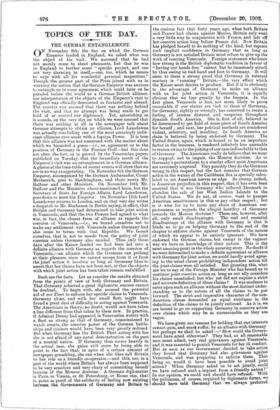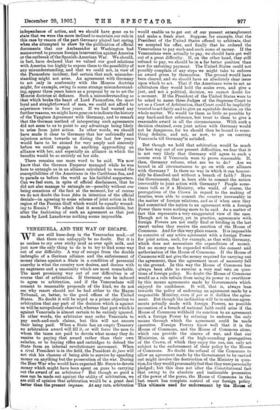TOPICS OF THE DAY.
THE GERMAN ENTANGLEMENT.
ON November 8th, the day on which the German Emperor landed in England, we asked what was the object of his visit. We assumed that he had not merely come to shoot pheasants, but that he was in England to further some " specific project, and one not very alarming in itself,—one, too, which he means to urge with all his wonderful personal magnetism." Though the greater part of the Press joined with us in warning the nation that the German Emperor was anxious to entangle us in some agreement which could later on be paraded before the world as a German-British alliance, our interpretation of the objects of the Emperor's visit to England was officially denounced as fantastic and absurd. The country was assured that there was nothing behind the visit, and that no attempt was being made to get hold of or control our diplomacy. Yet, astonishing as it sounds, on the very day on which we were assured that there was nothing at all in the newspaper talk about German attempts to obtain an alliance, Lord Lansdowne was actually concluding one of the most amazingly indis- creet alliances ever made with a foreign Power. It is true that this alliance was not concerned with the matter about which we hazarded a guess—i.e., an agreement as to the position of Germany in the Persian Gulf—but this does not alter the fact, as is proved by the Venezuelan papers published on Tuesday, that the immediate result of the Emperor's visit was an entanglement in a German alliance. A glance at the time-table of recent events will show that we are in no way exaggerating. On November 8th the German Emperor, accompanied by the German Ambassador, Count Metternich, goes to Sandringham, and there meets Mr. Balfour and other Ministers. On November 10th Mr. Balfour and the Ministers above-mentioned leave, but the Secretary of State for Foreign Affairs. Lord Lansdowne, goes down to meet the Emperor. On November 11th Lord Lansdowne returns to London, and on that very day writes a despatch to Mr. Buchanan in Berlin saying, in effect, that Britain and Germany had determined to take joint action in Venezuela, and that the two Powers had agreed to what was, in fact, the closest form of alliance as regards the coercion of Venezuela,—i.e., we bound ourselves not to make any settlement with Venezuela unless Germany had also come to terms with that Republic. We bound ourselves, that is, not to recede from the policy of joint coercion unless Germany also receded. Thus only three days after the Kaiser landed we had been led into a definite alliance with Germany as regards the coercion of Venezuela,—an alliance which the Germans can prolong at their pleasure, since we cannot escape from it or from the joint action it involves as long as Germany likes to assert that her claims have not been met, or that the objects with which joint action has been taken remain unfulfilled.
Such are the facts. Let us consider the results obtained from the points of view of both Germany and Britain. That Germany achieved a great diplomatic success cannot be doubted. To begin with, she secured the powerful aid of our Fleet to enforce her specific claims in Venezuela. Germany alone, and with her small fleet, might have found a great deal of difficulty in acting against Venezuela. The Americans in theory, no doubt, would not have taken a line different from that taken by them now. In practice, if Admiral Dewey had appeared in Venezuelan waters with a fleet as strong as that of Germany, commissioned to watch events, the coercive power of the German battle- ships and cruisers would have been very greatly reduced. But when Germany has the British Fleet acting with her she is not afraid of any naval demonstration on the part of a neutral nation. If Germany thus scores heavily in the actual case, she gains still more by being able to point to the fact that, in spite of a certain amount of newspaper grumbling, she can when she likes call Britain to her side as a friendly co-operator,—and this, too, in a part of the world where Britain has always been supposed to be very sensitive and very chary of committing herself because of the Monroe doctrine. A German diplomatist in Paris, or Vienna, or St. Petersburg, or Rome can, that is, point as proof of the solidarity of feeling now existing between the Governments of Germany and Britain to the curious fact that forty years ago, when both Britain and France had claims against Mexico, Britain only went a very little way in conjunction with France, and left off her coercive action long before France did. Now Britain has pledged herself to do nothing of the kind, but reposes such implicit confidence in Germany that as long as Germany is not satisfied Britain must refuse to give up the work of coercing Venezuela. Foreign statesmen who know how strong is the British diplomatic tradition in favour of " having our hands free " cannot but be immensely -struck by thus seeing us tied hand and foot to Germany. It will seem to them a strong proof that Germany in external matters is " running " Britain,—the very effect which the Kaiser most desires to produce. But if it is obviously to the advantage of Germany to make an alliance with us for joint action in Venezuela, it is equally obvious that we lose greatly by the bargain. In the first place, Venezuela is less, not more, likely to prove reasonable if our claims are tied to those of Germany, for Germany, rightly or wrongly, has contrived to create a, feeling of intense distrust and suspicion throughout Spanish South America. She is, first of all, believed to be determined to get hold of some piece of South America, for herself ; and next, her political methods are considered violent, arbitrary, and insulting. In South America no claim is bettered by being endorsed by Germany. The United States, again, which is bound to be an important factor in the business, is rendered infinitely less amenable to reason owing to the joining of our case indissolubly to that of Germany. The Americans really do believe that we want to support, not to impair, the Monroe doctrine. As to Germany's protestations to a similar effect most Americans are extremely sceptical. Very possibly they do the Germans wrong in this respect, but the fact remains that German action in the waters of the Caribbean Sea is specially calcu- lated to set American nerves on edge. So strong, indeed, is American prejudice in this respect, that it has even been asserted that it was Germany who induced Denmark to abandon the sale of her West Indian Islands to the 'United States. We do not, of course, want to pamper American sensitiveness in this or any other respect ; but is it wise for us to incur any share of American sus- piciousness as regards the alleged hostility of Germany towards the Monroe doctrine ? These are, however, after all, only small disadvantages. The real and essential disadvantage of the alliance with Germany is that it binds us to go on helping Germany to the end of the chapter to enforce claims against Venezuela of the nature of which we appear to be entirely ignorant. We have endorsed the German claims, but except in the vaguest way we have no knowledge of their nature. This is the most amazing point in the whole amazing story. No doubt if we were determined to make a definite agreement or alliance with Germany for joint action, we could hardly avoid agree- ing to the usual clause prohibiting independent action till the joint claims were all satisfied. But granting this, what are we to say of the Foreign Minister who has bound us to continue joint coercive action as long as our ally considers his claims unsatisfied, but who yet did not require a strict and accurate definition of those claims ? It was madness to enter upon such an alliance without the most distinct under- standing as to the nature of all the claims to be put forward. The strict and imperative character of the non- desertion clause demanded an equal strictness in the definition of the claims to be jointly enforced. As it is, we are bound to go on supporting Germany in coercive action over claims which may be as unreasonable as they are vague.
We have given our reasons for holding that our interests cannot gain, and must suffer, by an alliance with Germany but perhaps we shall be asked :—` How could the Govern- ment have acted otherwise ? They had, as all reasonable men must admit, very real grievances against Venezuela, and it was essential to punish Venezuela for her ill conduct. But as soon as our Government decided to take action they found that Germany had also grievances against Venezuela, and was preparing to enforce them. That being. so, would it have been possible to avoid joint action ? When Germany asked us to act jointly, could we have refused such a request from a friendly nation? In our opinion, we could and should have refused. With the politeness, of course, required by diplomatic forms, we should have told Germany that we always preferred independence of action, and we should have gone on to state that we were the more inclined to maintain our rule in this case by reason of the part Germany played last spring when she attempted to show by the publication of official documents that our Ambassador at Washington had manoeuvred to procure foreign intervention against America at the outbreak of the Spanish-American War. We should, in fact, have declared that we valued our good relations with America too highly to expose them to the possibility of any misunderstanding, and that we could not, in view of the Pauncefote incident, feel certain that such misunder- standing might not arise. An agreement with Germany to act only in conformity with the Monroe doctrine might, for example, owing to some strange misunderstand- ing, appear three years hence as a proposal by us to set the Monroe doctrine at defiance. Such a misunderstanding as that which broke the heart of Lord Pauncefote, the most loyal and straightforward of men, we could not afford to experience twice in four years. If we had wanted any further reasons, we might have gone on to indicate the history of the Yangtsze Agreement with Germany, and to remark that the German method of interpreting such agreements did not seem to us to point to any advantage being likely to arise from joint action. In other words, we should have made it clear to Germany that her unfriendly and injurious action towards us during the last few years would have to be atoned for very amply and sincerely before we could engage in anything approaching an alliance with her, and especially an alliance in which the benefits would be so entirely on her side.
There remains one more word to be said. We now know that the German Emperor managed while he was here to entangle us in an alliance calculated to wound the susceptibilities of the Americans in the Caribbean Sea, and to parade us before the world as his faithful supporters. Can we feel sure, in spite of official disclaimers, that he did not also manage to entangle us—possibly without our being conscious of the fact at the moment, for of course we do not doubt the bona fides in intention of the official denials—in agreeing to some scheme of joint action in the region of the Persian Gulf which would be equally wound- ing to Russia ? We admit that it sounds incredible, but after the fashioning of such an agreement as that just made by Lord Lansdowne nothing seems impossible.











































 Previous page
Previous page